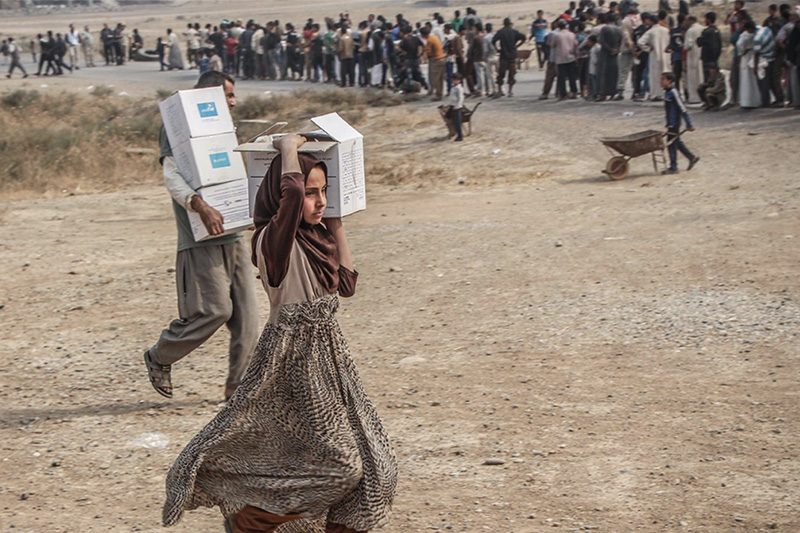One of the unique aspects of the Global Affairs major is the Senior Capstone, a hands-on experience during which students have the opportunity to work on real-world public policy problems for a range of external partners. For the Senior Capstone, my team (six seniors and our faculty advisor) examined the impacts of United Nations sanctions on the delivery of humanitarian assistance for the United States Department of State.
In December 2020, the United Nations Office for the Coordination of Humanitarian Affairs projected that a record 235 million people would need humanitarian assistance or protection in 2021 — a nearly 40% increase from the projection at the end of 2019. This underscores the seriousness to deliver aid. The majority of this aid is coordinated by nonprofit organizations that operate in some of the most difficult regions around the world, facing inherent barriers to their work. This aid is typically transferred internationally through financial institutions. Although sanctions serve as one of the United Nation Security Council’s critical foreign policy tools to target bad actors, sanctions introduce risks for all involved humanitarian stakeholders, including nonprofit organizations, financial institutions and government and donor agencies. These chilling effects complicate the delivery of humanitarian assistance because of organizations’ fears of violating sanctions, as well as the difficulty, in some instances, in avoiding violating them. This necessitates the minimization of sanctions’ negative effects through practical policy improvements. Importantly, sanctions are not the sole blame for aid delivery problems, but they add further difficulties that can be avoided while upholding effective counterterrorism measures.
To date, United Nations sanctions regimes have relied on a handful of mechanisms such as exemptions and exceptions, to facilitate the delivery of humanitarian aid in conflict regions. Additionally, nonprofit organizations’ host countries can grant licenses to permit humanitarian work. Still, these are not problem-free solutions. These procedures can take too long to be helpful, and some nonprofit organizations do not have adequate resources to undergo additional screening processes.
To formulate policy options for the United States Department of State, the team employed multiple research methods, including undertaking desk research, conducting expert interviews, writing case studies and designing a survey focused on nonprofit organizations. Although all methodologies were critical in developing robust policy options, the survey provided direct quantitative and qualitative insights into the issues faced by a wide variety of nonprofit organizations, including large, multinational entities and smaller, local organizations, in delivering assistance to specific regions. Prior to the release of this survey, the data in the field was limited.
The survey collected data confirming that sanctions and counterterrorism measures, as well as their downstream responses, result in several negative consequences for nonprofit organizations. For example, the survey found that 63% of nonprofit organizations suffered financial access problems due to financial sector derisking. Derisking occurs when financial institutions are reluctant to work with humanitarian actors in certain regions, including sanctioned jurisdictions, because they are fearful of running afoul of regulatory and due diligence requirements — they seek to avoid risks associated with charitable clients, rather than manage and mitigate these risks. 47% of nonprofit organizations experienced these problems frequently or constantly. Interestingly, these issues were experienced by nonprofit organizations of all sizes, and most problems occurred in the Middle East and North Africa. Because of the negative impacts of financial access problems, over 80% of nonprofit organizations utilized workarounds to the formal financial sector. In addition to issues with transferring funds, nearly 40% of nonprofit organizations reported difficulties sending goods into sanctioned countries. Even with governmental frameworks to facilitate delivering assistance to sanctioned jurisdictions, 27% of respondents who reported seeking licenses and exemptions ran into issues. Just these snapshots of the survey results underscore the problems that nonprofit organizations face when trying to deliver life-saving aid.
During my Senior Capstone, I had the opportunity to use all of the knowledge and skills that I had learned over my four years at Yale — it was the perfect experience and was the most memorable course that I have taken. Throughout the semester, there were countless chances to significantly engage with this issue, such as: working directly with the United States Department of State on developing practical policy solutions; approaching the topic from multiple perspectives, including policy, financial and legal, as well as qualitative and quantitative ones; and engaging with many individuals and organizations representing each type of the various stakeholders. For example, in just one week, we met with policy officials at the United States Department of the Treasury, Assistant General Counsel at the United States Agency for International Development and a leader of a prominent financial institution’s humanitarian banking division. Even as undergraduate students, the team was treated by all with the utmost respect and seriousness. The team decided on the direction of our work, such as developing a nonprofit organization-focused survey, and led meetings and conducted interviews with outside entities. In addition to these wonderful opportunities, one of the greatest takeaways from the Senior Capstone was the relationships and bonds with my team members and faculty advisor. I did not only leave my Senior Capstone with an incredible academic experience to conclude my time as a Global Affairs major, but also came out with a new group of good friends.
The data report can be found here.
The views expressed in this post are those of the Yale Senior Capstone team and are not meant to represent the views held by the United States Department of State or any of the mentioned entities.
